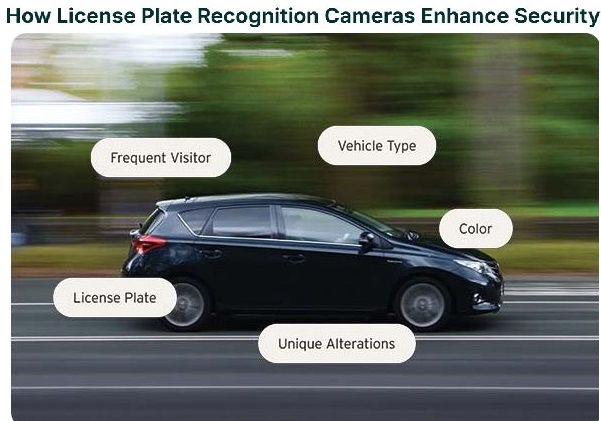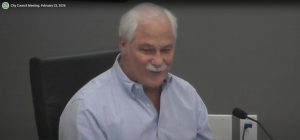Police Commission to take up license plate reader policy
8 min read
Presenter: Another police commissioner is taken by surprise, and first learns about a Eugene Police Department initiative from the media.
Earlier this year, Police Commission Chair and Asian American business owner Jensina Hawkins learned from the Register-Guard that an international crime ring was targeting Asian American business owners. At the Police Commission June 12, the topic was license plate reader technology. Commissioner Alan Leiman:
[00:00:23] Alan Leiman (Police Commission): Maybe I missed it, maybe I’m wrong, but I was surprised about the license plate readers. I did not know that we were considering that and we spend a lot of time on technology. We spent a lot of time on the Guardian trailers. We spent, yeah, we’ve been doing a lot of talk about facial recognition.
[00:00:41] I just would have hoped that, hey, we’re considering this, you know. I know that you make the decision and, you know, you’re going to ask for consent or anything, but just to read about that in the paper, I was surprised and I was asked about it by someone and I was rightly a little embarrassed that I didn’t know.
[00:01:04] And if I missed it, I apologize that it could have been talked about and I missed it and I don’t want to be that person. And then, you know, the story out of Texas of a similar system, not the one that we are using, but being used to search all 50 states to see where someone had an abortion. You know, that is troubling.
So, again, we’re in territory, I believe, as a commission, that we ought to look at the policy around license plate readers. And if there isn’t one, I suggest that there should be one.
[00:01:40] But I have confidence in EPD and the Chief, that he will navigate these waters that hopefully don’t get too troubled. So thank you.
[00:01:50] Presenter: City Councilor Randy Groves:
[00:01:52] Councilor Randy Groves: Regarding the Flock camera system, I’ve been receiving some emails on that. The Police Auditor’s Office responded to one, but I’ll tell you, I got some great information… and I’ve been including that in my responses in explaining that the system was vetted.
I also proudly say that the murder suspects of the double homicide that we recently had were apprehended in Great Park because of the license plate readers. There was an amber alert that was also satisfied, which is abducted juvenile, due in great part to the LPR system, and the suspect in the embezzlement at the Eugene Weekly was apprehended in Ohio, not from the Eugene camera system, but from the local law enforcement camera reader or license plate reader system back there.
[00:02:50] So there’s certainly an upside. What I’ve been saying in my responses to the community, I did know that this was happening, but it was probably through council. I don’t even remember where I first heard about it.
[00:03:01] But I’ve been saying, the system has been vetted. The contract with Flock was gone over in great detail and there’s a lot of protections in there where EPD owns the data and Flock can’t access it and use it for other purposes, nor can anyone else without EPTs authorization.
[00:03:22] And correct me if I’m wrong, Chief, but my understanding is it’s only going to be used for law enforcement and you have to authorize that before it can be opened up to them. So there’s a number of safeguards in place.
[00:03:37] And then the other thing I end with in these responses, I’ve been making community members is: We have a very robust community oversight system.
[00:03:48] I mean, you think about everything we have. First of all, police officers have body cams. There’s in-car cams. We have an independent police auditor that reports directly to the city council. We have a citizen review board that reviews significant events and cases and we have a police commission whose role is to be reviewing the policy.
[00:04:13] So I don’t think, and I’m not an expert on this because I’m not in the police industry, but my guess is there’s not a lot of police departments that have as much as we have here in Eugene. And I think we should have a reasonable level of trust and confidence inthe system that’s here that covers a lot of areas.
[00:04:37] Presenter: Chief Chris Skinner:
[00:04:39] Chris Skinner (Eugene Police Department, chief): I hear you loud and clear on the LPR. Actually, we are in the final stages of the LPR policy that I would suggest that the Police Commission could take on and take a look at. The LPR, which is license plate reader, has been existed in the city for years. It’s being, it’s used by parking enforcement and out of the airport and has been for years.
This is a result of an Oregon Criminal Justice Commission grant specifically awarded to us to help combat our organized retail theft. What we see and what LPR data has been able to prove so useful in is the people that are involved in retail theft are often showing up at some of our biggest retailers and driving away with thousands and thousands of thousands of dollars of goods and the LPR is designed to help us be able to track that when we get suspect vehicle information.
[00:05:41] I’ve got a really, really good fact sheet that I’m happy to send the commission that the city manager and city has to help answer some of these questions and answers many of the questions that you may have. But some of the highlights are, you know, LPR is used for criminal behavior.
[00:05:58] We can leverage LPR behavior for other things like Silver and Amber Alerts and if we have a suspect or a vehicle, not suspect, but vehicle information to help us be able to do those types of things.
[00:06:09] We own that data. We don’t share that data with anybody without our express or at least my expressed authorization around that. So they don’t have access. Other people don’t have access to that data. It’s exactly what it sounds. It only takes the license plate from the rear of the vehicle only, not the front of the vehicle. So everything is rear vehicle only.
[00:06:35] And so it’ll be very, very useful for us for a lot of things that are useful for stolen vehicle cases, organized retail theft cases, as Councilor Groves said, even before it’s been up and working, we felt like there was an exigent need to leverage the data that we did have after the county’s double homicide, and so we were able to leverage that data and be able to do that.
[00:07:02] But we’re going through final policy and certification and training in-house, so technically it’s not up and running yet, when it’s full in all of its glory. And so we’re happy to offer policy. There’s been other pieces of technology that have followed the same path. For instance, for the camera trailers were purchased well before we built policy.
I may have mentioned something about the camera trailers and in your case, just to honor your thoughts. I probably didn’t mention LPR data like you would have wished I would have done. So that’s on me to not mention that.
But I do think that there’s you know, clearly there’s an interest in wanting to look at that LPR policy. I remind the commission that we’ve done some work in prior, and it’s already embedded in our policy around technology that facial recognition isn’t a part of any technology we use. So it’s already there. We will adhere to that. Obviously, I’m not sure we need to restate it in the LPR policy, because we already have stated that it’s not a part of any technology that we use, but we’re happy to.
[00:08:12] If you want to put it on your agenda… the ALPR policy is published for us, which means that it’s now pretty much open for us to be able to make any changes. And so it’s finished is what I’m saying… So we can do that. So that’s certainly available to you to take a look at.
[00:08:30] Presenter: For the Asian American community, a positive outcome, as community members reach out to establish a new relationship with the police. Jensina Hawkins:
[00:08:38] Jensina Hawkins (Eugene Police Commission): It is nice to know that in some cases, the system does work.
[00:08:42] I sit on the board of the Asian American Council of Oregon, and one of the cases in particular was a suspect that’s is allegedly involved with burglaries targeting Asian households here in Eugene.
[00:08:55] And so with the partnership of Jenny Jonak, who if any of you know her, she is a force to be reckoned with, we were able to really create some awareness within the AAPI (Asian American Pacific Islander) community in Eugene as well as strengthening the relationship with EPD to make sure that we have those communications and that those persons who identify within our community, feel safe reaching out to law enforcement, filing those reports and hopefully have the faith that they go all the way to the district attorney, that there are actual warrants and indictments filed.
[00:09:28] Presenter:: The meeting also included praise from the police chief for local peace activists. The organizers of the ‘No Kings’ protest changed their original plans based on recommendations from EPD Chief Chris Skinner:
[00:09:41] Chris Skinner (Eugene Police Department, chief): They had an original route that we had some issues with because it created some potential for disruption at Saturday Market. They very quickly determined that they didn’t want to be that disruptive to Saturday Market and changed their parade route.
[00:09:54] And so I’m really encouraged by how much engagement we’ve had. And for everything that goes on in Eugene that involves this type of gathering, we are reaching out to organizers and wanting to find a successful and safe solution for those. And so we continue to do that and it’s been so far very successful, so I think we’re well positioned and well planned.
[00:10:14] What my hope is for this community is that they find a way to be able to be heard during that march without feeling like they need to replicate what they’ve seen across the country. Because this—we all live in this community, we love this community. We want to make sure that you know, we always want to leave it better than we found it.
[00:10:34] Presenter: EPD is already using the license plate reader technology and hopes to soon start discussing an official department policy governing its use.




